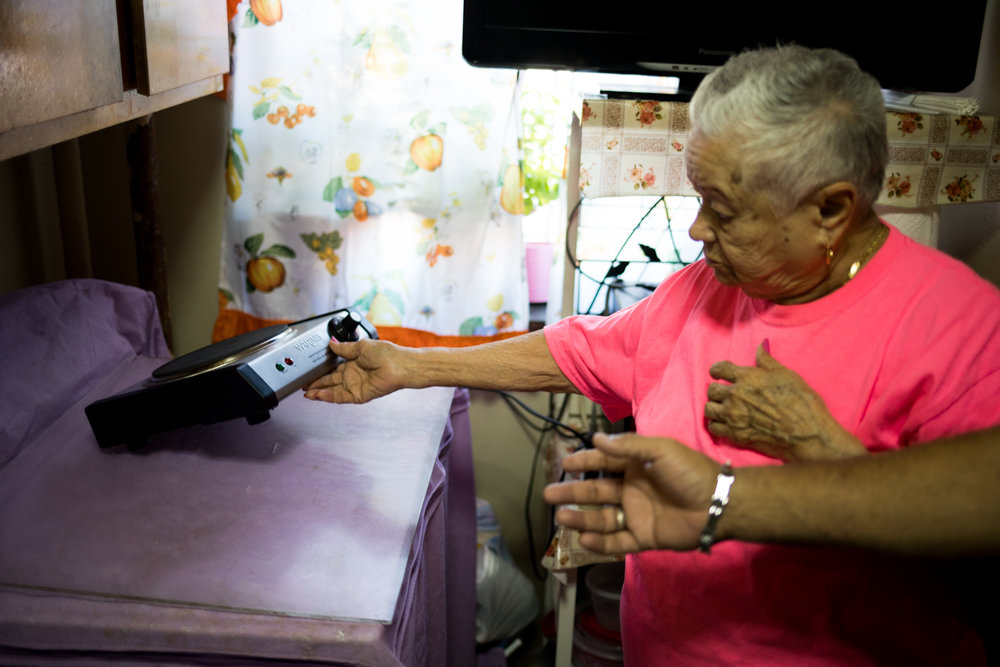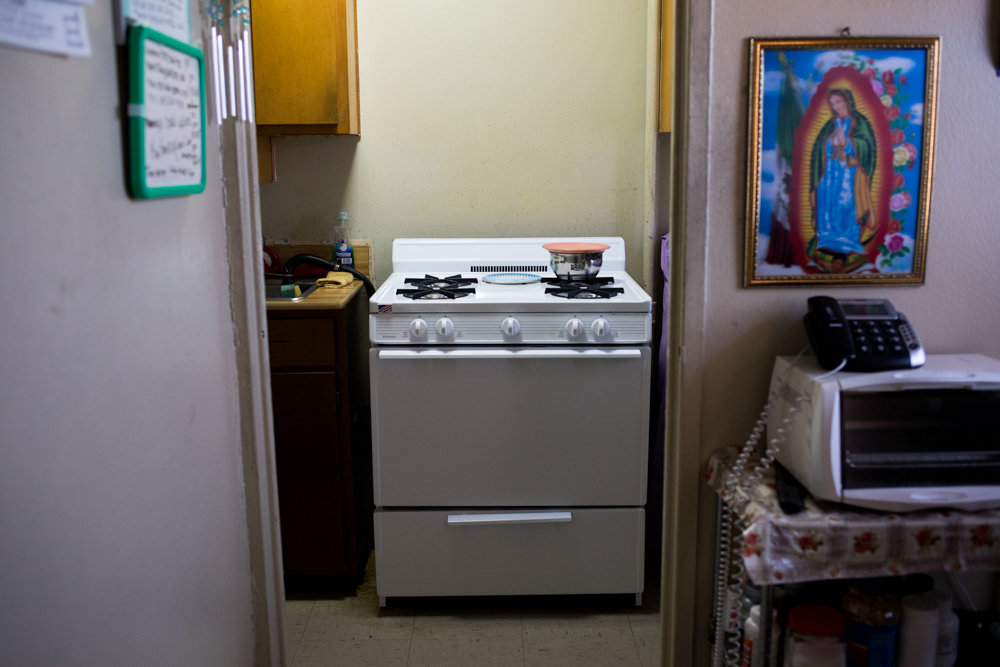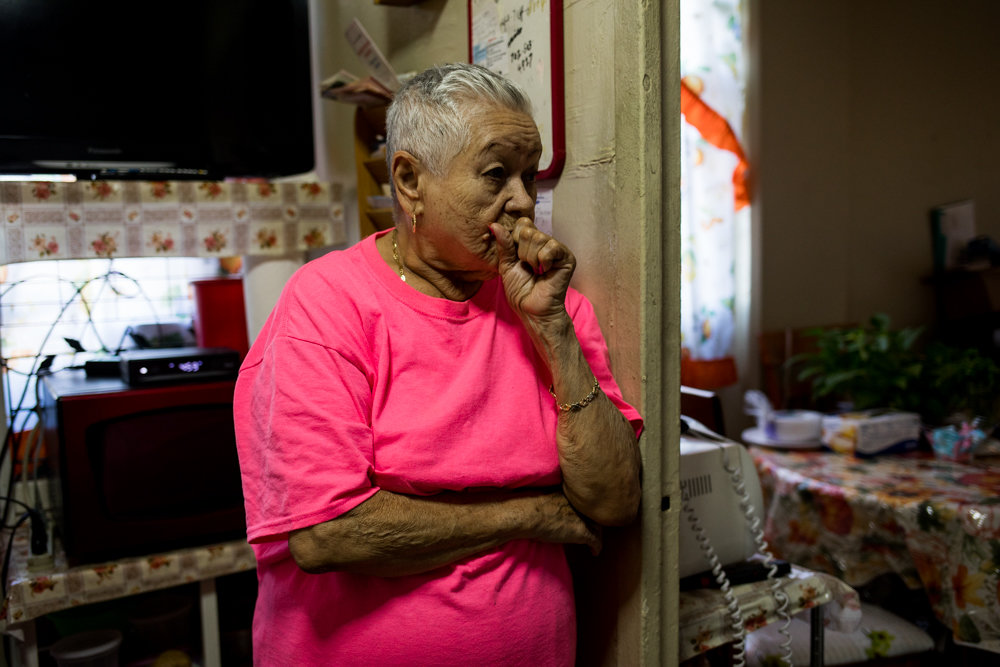Marble Hill residents suffer without gas, blast NYCHA
A shiny new stove gleams in Maximina Romero’s kitchen, but all it’s doing at the moment is taking up space. When it comes to cooking actual food, it’s a paltry hot plate sitting atop her washing machine that’s doing the heavy lifting.
“I want to throw the stove out the window,” Romero said. “It’s beautiful. And it doesn’t work.”
Romero, 85, has resided in the same eighth-floor apartment at Marble Hill Houses on West 230th Street for 40 years. But for the past couple months, she has lived without gas. And she’s not alone — the whole line of apartments in which hers falls has suffered the same plight, according to her son, Hector Torres.
Building management gave Romero the hot plate to cope in the meantime, but cooking is excruciatingly difficult on the measly apparatus, and buying takeout has become a real financial burden.
Romero suffers from Type 2 diabetes, while Torres’ 64-year-old brother, who also lives in the apartment, is dealing with what he says is the onset of Alzheimer’s. For health reasons, being able to cook hot, healthy meals is not only essential, it’s the glue that holds the family together.
“She loves to cook,” Torres said. “And we love to eat.”
Yet, waiting on NYCHA to correct the issue has proved maddening.
NYCHA tells Torres “they don’t know when it’s going to be fixed,” he said. “They tell you, ‘In a month.’ When you come back, they tell you another month, then another. My mother spoke to them, too, and they told her they’re not sure. ‘You might have to wait.’”
Torres also tried reaching Con Edison several times but couldn’t get through.
Originally, building management promised repairs would be completed by the end of October, Torres said. But Oct. 23 will make two months the family’s lived without gas. Work hasn’t even started, and is now slated for December.
“Why should my mother have to wait that long?” Torres asked. “It’s ridiculous. A person can only deal with so much.”
Gas appears to be functioning for other apartments in the building, however, Torres said. But some buildings other than his mother’s also are suffering from outages.
According to NYCHA’s website, a gas outage was reported at Romero’s building Aug. 24, with status listed as “in progress” as of Oct. 14, along with a few others first reported in July and August.
When a gas line is breached, completing repairs can be something of a drawn-out process, said Tony Edwards, president of the Marble Hill Resident Council. It requires filing and approval of permits from the city’s buildings department, ensuring access to apartments if the repair requires replacing the risers, as well as plumber availability and coordination with ConEd.
“Though the work is an inconvenience to many,” Edwards said, “it is required work that has to be completed correctly.”
Each of the outage-afflicted buildings listed on the housing authority’s website require additional repairs — to be done by NYCHA — before ConEd inspects and restores gas service, ConEd spokesman Robert McGee said.
In order to turn on an existing service, ConEd requires various documents to be completed and filed, including a pressure test verification sealed by a licensed plumber. If piping is changed, the altered layout must be compliant with city and ConEd code.
Only after ConEd has received all required documents will they inspect and restore service — provided their own tests show the building is ready to receive gas.
“While we understand gas service interruptions are inconvenient, we also want to ensure our residents’ safety,” NYCHA spokesman Chester Soria said, adding the agency’s staff would keep residents “informed” while working to restore service “as quickly as possible.”
Which may not be so quick — probably no less than a month, actually — given repairs require abatement, permits and skilled tradespersons.
But Charles Moerdler —a member of the city’s Housing Development Corp. — is having none of it. NYCHA needs to “get its act together and provide proper service” to residents, he said.
The agency “is mismanaged, incompetent, and borders on the dysfunctional,” Moerdler said. “It has been that way for some years, at least for the last five or six,” and “ought to be placed in receivership.”
Yet, the blame falls not just on NYCHA, Moerdler said. One of his chief responsibilities while serving as city housing and buildings commissioner was inspecting all NYCHA buildings to ensure they complied with housing maintenance, building, and other applicable sanitary codes.
“There has not been that kind of cellar-to-roof inspection by the Department of Buildings for the past few years,” Moerdler said. “It’s high time (DOB) did its job and examined those buildings. They are mismanaged, and the people in them are being treated in the worst possible way.
“If it were up to me, I’d fire every one of the senior managers within NYCHA.”
But ConEd is “almost in the same league as NYCHA,” Moerdler said, an entity that’s “uncaring of people, that in my view does not adequately or properly discharge its public utility responsibility.”
That’s in clear view throughout Riverdale, Moerdler said, where streets are “torn up for work to be done, and they sit like that for months on end.”
And no less for public housing residents like Romero.
“Where people need gas,” Moerdler said, ConEd officers “mess around with paperwork and folderol that means absolutely nothing, in typical bureaucratic fashion, instead of taking care of people.”
Both Torres and his mother have had enough. Permits, protocol and procedure really don’t matter to them, and start to feel more like neglect. They just want to be able to enjoy hot, home-cooked meals again.
“I pay rent every month, but (NYCHA) don’t give me service,” Romero said in Spanish. “It’s terrible. I can’t wait until December.”











